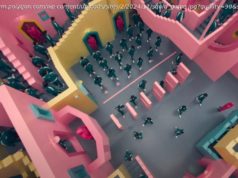If you’ve seen The Matrix, Terminator, or Wargames, you’ve probably already planned out your bunker for the post-AI apocalypse. Technology is changing continually, with newer and stranger devices created every week. Even the technology we never thought would go out of style is changing: Television is moving to the internet, the internet is reaching the remotest areas of the world, and the globe may soon be covered in actual
If you’ve seen The Matrix, Terminator, or Wargames, you’ve probably already planned out your bunker for the post-AI apocalypse. Technology is changing continually, with newer and stranger devices created every week. Even the technology we never thought would go out of style is changing: Television is moving to the internet, the internet is reaching the remotest areas of the world, and the globe may soon be covered in actual robots.
The eventual takeover of AI has been prophesized by hundreds of books, films, and TV shows, but a few brave directors see a brighter future for human and robot-kind. These three films show a positive side to the rise of AI, and I’m 90% sure they weren’t produced by robots. (Spoilers ahead!)
Coming off a groundbreaking streak of award-winning animated films, Pixar Studio’s 2008 animated movie WALL-E brings us the most adorable and lovable robot to ever grace the silver screen. Set in a pollution-ravaged future on the now-abandoned planet Earth, WALL-E tells the story of the little robot that could, and does so with delightfully little dialogue.
The film’s namesake character WALL-E is part of a line of garbage-sorting robots tasked with cleaning up Earth, but in 2805, he’s the only one of his kind left functioning. After gaining sentience and keeping himself running on spare parts, WALL-E falls in love with a cleaning robot named EVE and finds himself transported to a space-cruising starliner filled with very unhealthy humans. WALL-E’s discovery of a small plant points to new life back on Earth and a possible redemption for the now-feeble population of Earthlings.
WALL-E may be a family film, but it’s an astonishingly sharp take on our society’s consumption, our waste production, and the implications of our lifestyle choices on the future of the human race. WALL-E proves that sometimes, artificial intelligence may trump our own intelligence, and his bravery and love helps us get back in touch with our responsibility to our planet. WALL-E is one of the film world’s most beloved AI characters, and it’s easy to see why.
The aptly-named 2001 film A. I. Artificial Intelligence is director Steven Spielberg’s visually stunning depiction of a not-so-distant future and centers around a robotic child that feels a (literally) timeless affection for his programmed family.
Set in the post-climate change world of the 22nd century, A. I. follows the journey of David, an artificially-intelligent robot child called a “mecha” that can “imprint” onto its family, simulating the very human emotion of love.
A. I.’s David, played by Haley Joel Osment, blurs the line between programming and true affection. Over the course of the story, David’s love for his mother (played by Frances O’Connor) outlasts his family and the human race itself, pushing the plot towards the very distant future of human extinction. Unlike most AI-focused sci-fi films, the artificially intelligent mecha aren’t responsible for the loss of the human race, and their fascination with human beings drives them to clone David’s mother from a lock of hair, granting him one last day with his caretaker.
A. I. Artificial Intelligence depicts a very different story of artificial intelligence. In sequences like the movie’s “Flesh Fair,” a carnival focused on the destruction of obsolete mecha, human beings are depicted as the evil aggressors. The story’s main characters are all artificially intelligent, and we invest deeply in David’s quest to return to his mother. By creating a robot that can love, A. I. helps us love a robot, and that future looks a lot brighter than most AI-centered films tend to depict.
2009’s critically-acclaimed independent film Moon stars Sam Rockwell and Kevin Spacey in a very unconventional buddy comedy. Rockwell plays astronaut Sam Bell, the sole employee aboard a lunar station on a three-year stint to mine moon resources for Lunar Industries to ship back to Earth. To keep him from going stir-crazy, the base features a clever AI companion named GERTY, played by Spacey.
We immediately emphasize with the loneliness Sam experiences over his super-long work shift. Unsurprisingly, Sam grows quite close to GERTY, and the two create an impressive level of on-screen chemistry between a man and what looks like a Xerox machine. GERTY is Sam’s best friend, doctor, hairdresser, therapist, and, ultimately, his savior. As Sam discovers Lunar Industries’ nefarious and unethical plot to utilize clones of the original Sam Bell to work the impossible lunar shifts, GERTY helps Sam’s clone escape back to Earth, exposing the company and ultimately saving Sam (well, at least one of the Sams).
Confused? Well, know that Moon’s fantastic pacing, driven mostly by the witty banter of Sam and GERTY, grounds the film’s plot and introduces us to an AI we’d all want as a best friend.
Dr. Steven Hawking says “The development of full artificial intelligence could spell the end of the human race.” This statement makes a depiction of AI’s darker side which is one of the easiest tricks in the sci-fi book. These three films step outside the box to give us AI characters we can really fall in love with. This lighter side of AI speaks to a possible future where maybe, just maybe, robots don’t take over the Earth.
Brooke Nally is a freelance writer whose work is featured on Science Direct, The Sierra Club, and KSL Tech.






